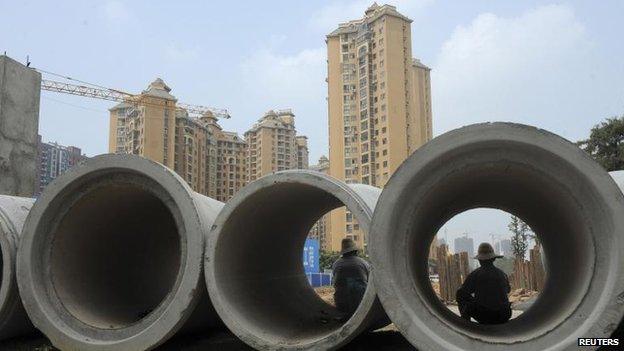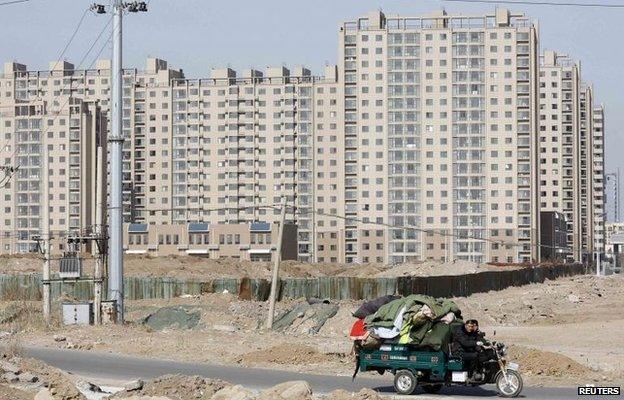China’s property conundrum
- Published
- comments

The various steps that China is taking to stem house price rises seems to be working, but can the government manage an orderly slowdown in the property sector?
The latest move is to reduce the reliance of local governments on the property market by allowing them to finance themselves through bonds, albeit for limited purposes.
It is a standard mechanism in market economies, but Beijing has been reluctant to allow local governments to issue debt even though a more sensible fiscal system between the central and local governments is necessary.
By not allowing local governments to raise independent financing from the bond market, they have instead relied on selling land use rights and property as a way of raising funds to fund their expenditures, especially since their share of the tax take isn't sufficient to cover their spending responsibilities.
I'll come back to this in a moment, but first, house prices have been falling in China for several months.
Prices for new homes fell in July in nearly all of the 70 cities tracked by the government, constituting the third straight month of price declines. The latest reports for August suggest another monthly decline.
Property developers are slashing prices to unload houses to try to revive sales. In the first seven months of the year, home sales fell by 10.5%, according to research by one of the major rating companies, Moody's. Another one, Fitch, finds that new construction is down 20% across the country.
Offshore market
The property sector, broadly defined, accounts for around 16% of the economy and has been an important engine of growth. But, the government has been trying to restrain house prices for fear of a crash, and cash has become scarcer from Chinese banks as a result.
So, property companies are heading for a newly opened avenue, i.e. the offshore market, where foreign banks provide loans. Builders such as Central China Real Estate Ltd, Poly Property Group Co. and Yuexiu Property Co. Ltd are seeking financing offshore, according to Bloomberg.
It's not a huge amount but $5.9bn has been borrowed offshore this year, which is about 40% higher than a year ago. More worryingly, Bloomberg reports that debt for homebuilders is at 128% of equity.
That is perhaps the most worrying indicator.
The amount of debt is fairly determinative of the impact of a housing crash.

If households put down large deposits, as they tend to in China, then even if house prices fall it can be manageable for homeowners. Even negative equity, where the value of a home is less than the mortgage, is not a disaster so long as the mortgage is affordable.
But, property developers, unlike households, tend to take on more debt. It's true in China as it is elsewhere.
If Chinese homebuilders' debt exceeds the equity that they hold, which would largely consist of the value of their properties, by nearly 30%, then it raises the risk that declining prices will lead to an inability to repay that debt. And, if they are seeking to borrow from offshore, then it suggests that they have financing difficulties. And going offshore begins to drag in global banks, though the amount of their exposure remains small.
So, if these property companies can't repay the loans that they have borrowed, then that could affect the banks. And if banks end up holding a lot of non-performing loans, then they would sell assets to try to recoup some of their money.
It can lead to a fire sale in the property sector that further pulls down property prices, which in turn worsens the value of the equity held by companies and also banks.
This is the pattern witnessed in other banking crisis around the world.
Affordability
What's worse for China is that this would be its first significant property crash. It was only in 1998 when housing became detached from the state-owned enterprise or "work unit" that had allocated flats as part of the "iron rice bowl" of assigned jobs and benefits under central planning. The property market only took off after 2001 when housing was privatised.
In the decade or so since then, the Chinese housing market has grown exponentially. Starting from a low base, price rises aren't entirely surprising. But, by the gauge of affordability, the ratios of house prices to annual household income are among the highest in the world in major cities such as Beijing and Shanghai where it's over 10 times. By way of comparison, for pricey cities like London and New York, the ratio is below 10.
Now, as prices are falling, people are reportedly taking to the streets to protest. That's certainly another source of concern.
But, the government continues to restrain the property sector in other ways as well.
It has just permitted local governments - though only at the provincial level and not cities or towns - to issue bonds to finance public projects, though not general debt to pay for their budgets. As local governments are estimated to rely on land sales for around 60% of their revenues, the greater autonomy to raise debt to finance some expenditure is a small step toward easing their reliance on the property sector. Though a significant development, it is short of what's needed to rationalise the fiscal system in China, but is another indication of the concern over the housing market.
Moderating house prices is always challenging, and there is certainly a lot at stake as China attempts to engineer a soft landing for its property sector.